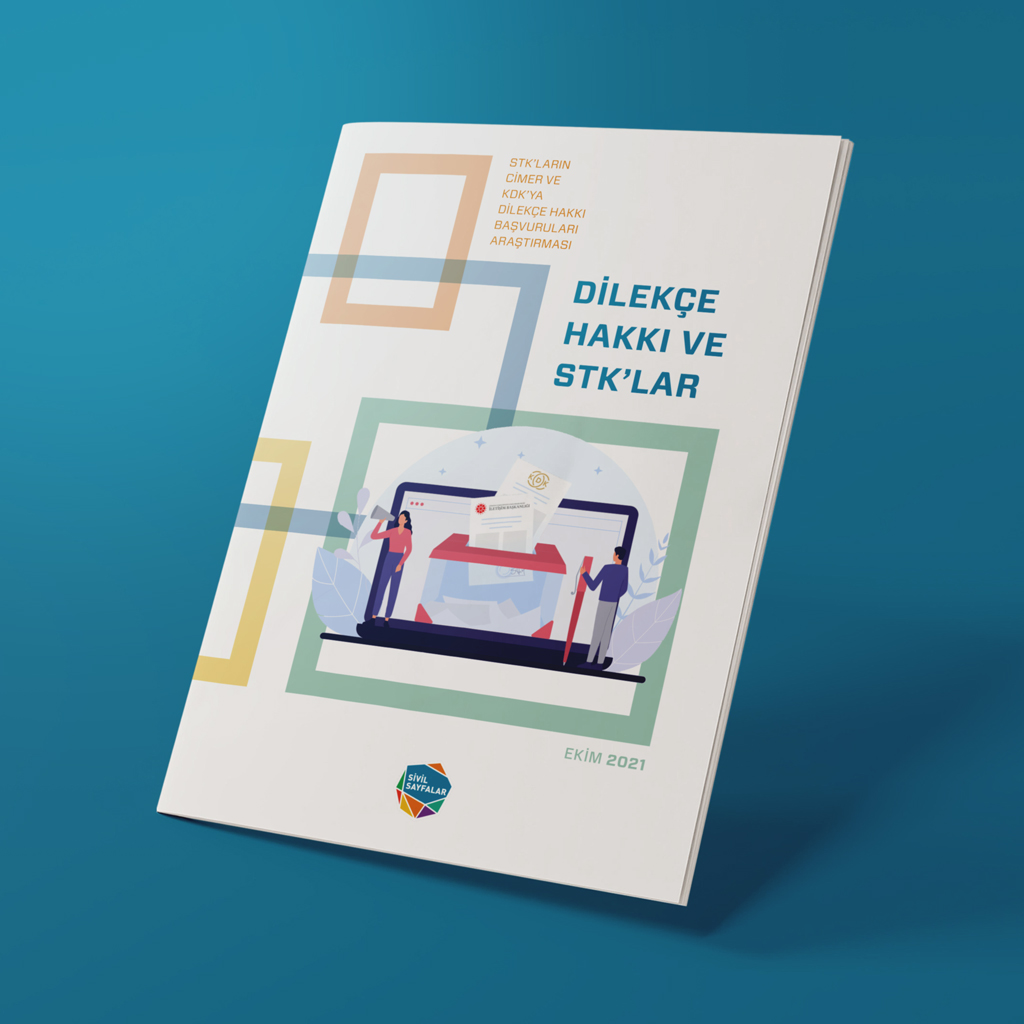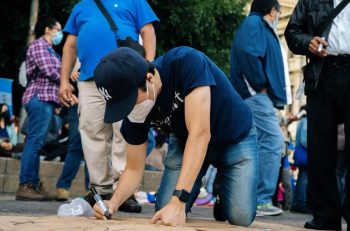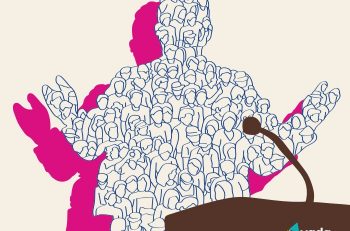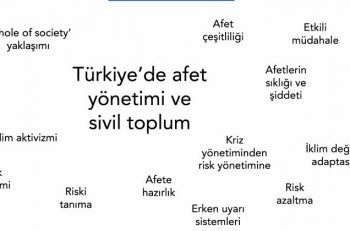Civil Pages’ ‘Monitoring the Applications of CSOs To the Directorate of Communications (CİMER) and The Ombudsman Institution’ Published

Civil society can make violations of rights visible to public institutions by using its right to petition. The second report of Civil Pages on the right to petition, ‘Monitoring the Applications of CSOs To the Directorate of Communications (CİMER) and The Ombudsman Institution’ has been published. According to the report, which concludes that civil society's petition applications to CIMER and the Ombudsman Institution (KDK) in the presidential government system are low, civil society does not use its right to petition effectively. In addition, in order to eliminate the violations of rights by using the right to petition, which is one of the most important tools of the freedom to seek justice, the existence of a democratic environment compatible with human rights criteria is essential in Turkey.
The ‘Monitoring the Applications of CSOs To the Directorate of Communications (CİMER) and The Ombudsman Institution’ prepared by Civil Pages with the support of ETKINIZ EU Program has been published. The monitoring study was prepared based on the determination that ‘the right to petition is an effective method for civil society to eliminate rights violations in participatory and human rights environments’.
In the study, petition applications made by civil society to the Presidency’s Communication Centre (CIMER) and the Ombudsman Institution (KDK) in the presidential government system were evaluated on the basis of international human rights standards.
It was found that the petition applications of non-governmental organizations remained at a low level in the presidential government system and that the civil society did not use its right to petition effectively. In the report, it was also determined that, like all other rights, it would be possible to eliminate violations of the right to petition, with the existence of a democratic environment in Turkey that is compatible with human rights criteria.
‘Monitoring the Applications of CSOs To the Directorate of Communications (CİMER) and The Ombudsman Institution’ was prepared to evaluate the applications made by NGOs to CIMER and KDK, two of the institutions authorized to receive applications within the scope of the right to petition in the presidential government system, on the basis of international human rights standards. It was also prepared in order to determine the level at which NGOs use their constitutional right to petition within the scope of the right to an effective solution and reparation in case of violation of rights.
Prior to this study, in the first monitoring study titled ‘STK’ların Dilekçe Hakkı Başvurularının İzlenmesi’ (Monitoring NGOs’ Applications for Petition Right) prepared by Civil Pages with the support of the ETKINIZ EU Program, the civil society actors were invited to three specialized commissions (Committee on Petitions, Human Rights Investigation Commission and Committee on Equal Opportunities for Women and Men) authorized to receive petitions in the Grand National Assembly of Turkey were analyzed.
‘Monitoring The Applications of CSOs To the Directorate of Communications (CİMER) and The Ombudsman Institution’ was conducted between March-July 2021. After the archive, media and literature review, meetings were held with 7 non-governmental organizations regarding the applications made to CIMER and KDK.
Petition Applications Regarding the Istanbul Convention and Canal Istanbul
In the report, the use of the right to petition by civil society and the responses given by CIMER and KDK are analyzed through two important examples such as the Istanbul Convention and Canal Istanbul.
In August 2020, when the discussions regarding the exit from the Istanbul Convention continued, women’s organizations applied to CIMER with nearly a thousand petitions under the leadership of the EŞİK Platform. These demands, which were forwarded to CIMER by individual women and women’s organizations, did not find a positive response, and Turkey officially withdrew from the Istanbul Convention as of July 1, 2021.
An important point to be emphasized at this point is that women’s rights defenders did not choose to apply to the KDK, although it is a human rights institution. Berrin Sönmez from the EŞİK Platform summarizes the reason for their application to CIMER as ‘to record their requests and to convey their statements to these institutions’.
Canal Istanbul discussions, another important agenda item in Turkey, were also one of the issues that were transferred to CIMER. People from 77 different countries and 69 cities of Turkey participated in the campaign. Many applications made within the scope of the right to petition for Canal Istanbul not to be implemented were rejected due to the determined attitude of the political power regarding the implementation of the project and its political priorities.
One of the few examples made by civil society to CIMER with positive results was the positive response received in the petition campaign of Kazdağı Doğal ve Kültürel Varlıkları Koruma Derneği (Mount Ida Natural and Cultural Heritage Conservation Society) of Doğu Biga Madencilik whose gold exploration license has expired to transfer the gold construction site in Çanakkale Kirazlı to the Regional Directorate of Forestry. With the positive response of CIMER to the petitions, the permits of the Canadian company Alamos Gold, which cut down 350 thousand trees in order to search for cyanide gold in the Mount Ida, were revoked. In this way, Mount Ida, which is one of the important topics in the environment, has resulted in a positive result with the acceptance of the applications.
Petition Applications of NGOs Are Low, They Do Not Use Their Right to Petition Effectively!
The findings of the research conducted by comparing the applications made to CIMER and KDK between the years 2015-2020 according to the human rights criteria are summarized under the following headings:
- The applications of NGOs in the presidential government system remained at a low level, as in the parliamentary system, and NGOs did not use their right to petition effectively.
- NGOs mainly preferred CIMER, their applications to KDK were more limited.
- Among the reasons for the limited number of applications made to the KDK, the fact that the KDK is less known in the public and not seen as an effective mechanism for eliminating rights violations came to the fore.
- Although CIMER is perceived as a relatively more effective institution, when the results of the petition applications are taken into account, it is seen that it has a limited effect in eliminating the violations of rights.
- It was concluded that in an evaluation to be made on the use of the right to petition by the civil society in the presidential government system, political conditions should also be included in the analysis.
- It has been determined that, like all other rights, the effective use of the right to petition by the civil society and the elimination of rights violations will be possible with the existence of a democratic environment in Turkey that is compatible with human rights criteria.
- The reasons why NGOs could not use their right to petition effectively were revealed within the framework of the experiences of NGOs using this right.
- In this study, it was concluded that the right to petition can be an effective method for eliminating rights violations, provided that there is a political environment in Turkey that complies with human rights criteria and observes the requirements of participatory democracy.
Suggestions for the Effective Use of the Right to Petition by Civil Society
Within the framework of the findings reached within the scope of the research and the determinations listed by CIMER and KDK for the efficient use of the right to petition, some of the prominent suggestions in the study in order for NGOs to use their right to petition effectively are as follows:
- Closely following the works of civil actors and public institutions, knowing the legislation well, making applications based on some concrete data and facts.
- NGOs’ insistence on making detailed and qualified applications to CIMER and KDK, reporting the positive and negative responses to the applications and sharing them with the public.
- Making more applications in order to get results from the applications, contacting the relevant public institutions that are the subject of the request, ensuring the follow-up of the applications in various ways.
- Increasing cooperation and dialogue channels between civil society and the public for the effective use of petition right by NGOs in the presidential government system.
- Developing cooperation between NGOs and with law faculties of universities and/or relevant academics in order to overcome the deficiencies of NGOs in legal literacy, political participation, and advocacy.
- Not only NGOs that carry out rights-based activities, but also other civil society actors acquire the knowledge and skills to use the right to petition effectively, and to diversify their advocacy activities based on the acceptance or rejection responses given to the petitions.
- Since it is a human rights institution, more applications are made to the KDK by NGOs for the elimination of rights violations, making more qualified and diversified applications to the institution.
The Turkish version of the report is here, and you can read the English version via this link.












Bizi Takip Edin